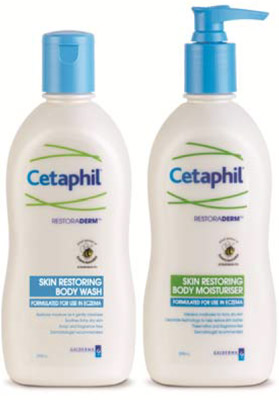Managing Eczema Flare-Ups This Spring

Managing Eczema Flare-Ups This Spring
Top tips from Dermatologist Dr Ann-Maree Kurzydlo
Eczema Awareness Week – 2 to 8 September 2013
The onset of spring means breaking out the skirts and putting away winter woollies. But for some this seasonal change can also cause hay fever and eczema-flare-ups. Many people therefore find it necessary to take proactive steps with their skin care routines in this period to minimise the occurrence of flare-ups.
In most cases eczema first develops in children under 5 years of age and approximately 1 in 5 children have some form of eczema. Though the majority of kids with eczema no longer have outbreaks by the time they reach their mid teens, it may linger into adulthood.
'A key part of managing eczema is to establish a daily skin care routine that preserves the skin barrier and reduces inflammation," says Dermatologist Dr Ann-Maree Kurzydlo. 'Ideally, this should be adopted all year round but is particularly important in September when seasonal environmental changes occur and we see a rise in the incidences of eczema flare-ups among adults."
For those prone to eczema, take proactive steps this season with the following tips from Dermatologist, Dr Ann-Maree Kurzydlo:
1. Take short, warm baths or showers, not long and hot, as hot water dries the skin.
2. Use soap free and fragrance free products. Soap strips oil from the skin and fragrance irritates eczema prone skin.
3. Avoid shampoo running over the body as much as possible when washing hair. Shampoo is full of detergents and other irritants which may worsen an eczema outbreak.
4. Apply a good moisturiser regularly and liberally after a bath or shower to help maintain skin barrier. Use moisturisers meant for sensitive skin or those made for eczema prone skin such as Cetaphil Restoraderm Skin Restoring Body Moisturiser.
5. Wear cotton clothing as much as possible rather than synthetics or wool.
6. Choose beauty products and sunscreens carefully. Look for products labelled 'low irritancy" or 'hypoallergenic" as hypoallergenic means the ingredients in the product are less likely to activate allergies.
7. When experiencing an eczema breakout avoid scrubs, exfoliating washes and toners, which are irritating. Do not use loofahs.
8. Eczema sufferers and those with sensitive skin should avoid products containing triclosan (an antibacterial agent), preservatives, and stronger concentrations of glycolic acids.
And when choosing cosmetics:
1. Avoid waterproof cosmetics as these require heavy duty cleansers that contain solvents to remove them. These cleansers also remove oil, dry the skin and cause more irritation.
2. In general, choose cosmetics which contain as few ingredients as possible. The fewer ingredients, the less likely you are to have a problem with the product.
3. For lipsticks, avoid long lasting lip colour. Ingredients in long wearing lip products are more likely to cause an allergic reaction.
4. Use pencil eyeliner rather than liquid. Pencil is usually wax based and liquid eyeliner may contain latex which irritates allergies.
5. In general, black eyeliner and mascara are the least allergenic.
6. Earth toned eye shadows (tan, cream, white and beige) are less irritating than darker colours because they have less colour pigment. Avoid glitter.
7. In general, face powders have fewer ingredients and fewer preservatives because they don't normally contain water, so they are a better choice for those with sensitive or eczema prone skin.
In conjunction with the Eczema Association of Australasia Inc, Cetaphil® RESTORADERM™ is a proud sponsor of Eczema Awareness Week which will be taking place Australia-wide on 2-8 September 2013.
Developed by dermatologists for eczema sufferers, the advanced formulations and patented technology of Cetaphil® RESTORADERM™ work to help restore the skin's natural moisture barrier and protect it against dryness.
STEP 1 – Cleanse: Cetaphil® RESTORADERM™ Skin Restoring Body Wash ($19.99 RRP) is formulated to help soothe itchy, dry, sensitive skin, while restoring moisture as it gently cleanses. This creamy, emollient rich, soap-free body wash contains skin-nourishing oils which nurture dry skin and help replenish skin barrier function. The innovative Skin Restoring Body Wash & Moisturiser formulas include filaggrin breakdown products – proteins which have both been shown to be depleted in eczema sufferers.
Step 2 – Moisturise: Cetaphil® RESTORADERM™ Skin Restoring Body Moisturiser ($25.99 RRP) is a rapid and long lasting moisturiser to help relieve itchy, dry, sensitive skin. This light, creamy, non-greasy moisturiser provides intensive hydration to help restore skin barrier function. The ceramide technology in Cetaphil® RESTORADERM™ Moisturiser works to put moisture back into skin, deeply moisturising layers of the epidermis – an essential factor in reducing the itchy and painful effects of eczema.
MORE
- Is Your Dad at Risk of Type 2 Diabetes?
- Australian-First Trial Examining Physical and...
- Dr Suzan Bekir Rosacea Treatment Interview
- Rebecca Hepatitis C Interview
- Cheryl Talent Eczema Awareness Month Interview
- Dee Honeychurch Paediatric Stroke Awareness...
- Have You Planned Your Heart Attack
- Sally Carkeet Living with Rheumatoid Arthritis...
- Managing Eczema Flare-Ups This Spring
- Rheumatoid Arthritis



